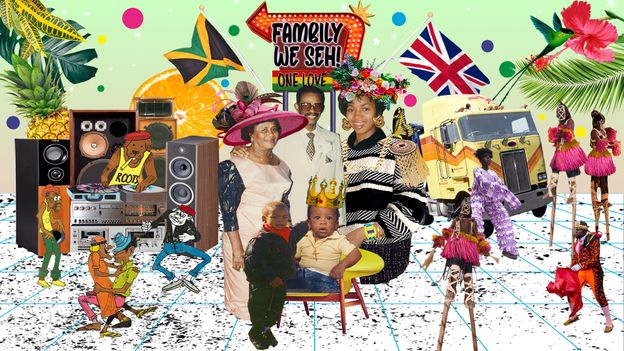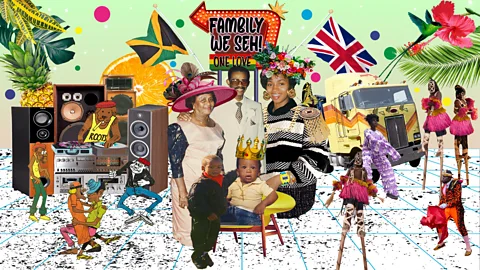 Idris Veitch and Wilfred Limonious
Idris Veitch and Wilfred LimoniousAround the world, people of Jamaican heritage are starting to reconnect with the island’s powerful language – and its complex history.
“Check di English bwoy dem try fi speak Patwa” – “Check these English boys trying to speak Patwa”.
This was often the response, amidst riotous laughter, from elders whenever my brother and I would speak our best interpretation of the Jamaican language, which is also often referred to as Patwa, Jamaican Creole or Patois.
Growing up in a Caribbean household in London, the smell of rice and peas cooking, the sounds of Vibes FM radio and bursts of Patwa, created a rich and vibrant space. Both of my parents are of Jamaican descent and identify as British-Jamaican. My grandparents and great-grandparents identify as Jamaican. They all speak standard English as well as Patwa, a language that emerged among enslaved Africans in the Caribbean under English colonial rule.
It always seemed electrifying to hear visceral, playful Patwa words like “raatid” and “Jeezam” to express surprise or annoyance, in a way that just couldn’t be communicated in English. Almost like verbalising an exclamation point. I would often hear Patwa in music playing at home: my maternal grandad, Junior Marvin, lead guitarist with Bob Marley and the Wailers, has heard mass audiences around the world sing along to lyrics infused with Patwa.
And yet, when my brother and I tried speaking in Patwa, we were shut down quickly by other relatives and elders, and told: “Speak proper English!”, meaning standard British English.
Why did Jamaican elders not want us to speak this joyful, powerful language?
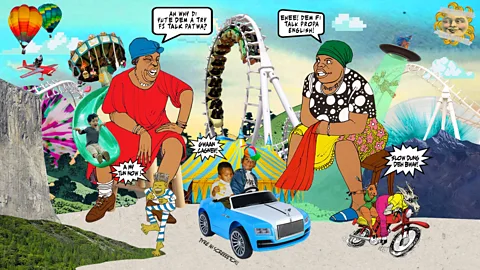 Idris Veitch and Wilfred Limonious
Idris Veitch and Wilfred LimoniousEven as a child, I had some understanding of the complex history that shaped attitudes towards Patwa, which is spoken by an estimated 2.5 million people as a first language and millions more from the Caribbean diaspora around the world. Exciting research that has emerged in the past decade is showing how people of Jamaican heritage are starting to reconnect with the language, its legacy, and what it means to its speakers.
“There’s joy and excitement when a Creole speaker meets another. They go into this unique space of mutual understanding,” says Shawna-Kay Tucker, assistant professor of applied linguistics at the University of Toronto, Canada.
Let’s Talk
This article is part of Let’s Talk, a BBC series about languages that explores how we can we use languages to live more fully, more adventurously, and more in touch with ourselves and others.
On the positive side, Tucker says: “The Jamaican language has become a central part of the linguistic fabric of Toronto. It’s now widely spoken by people who have no ethnic or heritage connection to Jamaica – more recently reignited by Toronto rapper native, Drake.” Yet the study also revealed that when it came to the perceived value of Jamaican Creole, people’s feelings were less positive, and infused with worry. Many Caribbean descendants felt the language could hold them back, especially in relation to their education, their job and negotiating in the global market, and expose them to racism and xenophobia.
Tucker says the results of the study were consistent with other research that has been done in the UK and Jamaica. The community’s complex feelings around Patwa have deep historical roots, researchers say, going back to the colonial era.
The word “patois” derives from a medieval French word meaning “rough and uncultivated speech”, says Jaspal Singh, Lecturer in Applied Linguistics and English Language at The Open University.
It was used in Europe as a way to describe how poor or rural people spoke, and later, used to refer to new languages that emerged in French colonies in the Caribbean, including Haiti, St Lucia, Guadeloupe, Martinque and several more. “[The term] ‘Patois’ then spread across the Caribbean to islands like Jamaica as a broader term to categorise their languages,” he says.
These languages emerged through a process known as creolisation, out of contact between different groups of people who did not have a common language. The history and status of Patwa are therefore intertwined with Jamaica’s colonial past.
“The language was a product of the 17th Century – a period of English expansionism, imperialism and transatlantic trading of enslaved Africans,” says Joseph Farquharson, senior lecturer in linguistics at the Department of Language, Linguistics & Philosophy and coordinator of the Jamaican Language Unit (JLU) at The University of the West Indies, Mona in Jamaica.
The first linguistic innovations in that context were so-called pidgin languages, which spontaneously mixed different influences from whichever languages the people on the ground happened to speak. “A pidgin arises when people come together who do not have a common language, and generally the first stage of working out a system of communication – very often in the context of trade,” says Farquharson. “When the pidgin becomes the native language of a set of people, it then transforms into a creole,” he says.
Once it became established, Jamaican Patwa was handed down the generations, becoming more standardised as new generations spoke it as their mother tongue. Today, it is a blend of dialects of English and various African languages where enslaved Africans were drawn from the coast of West Africa stretching from the Senegambia region down to Angola, and possibly beyond. For example, the Patwa word “unu“ (“you” in the plural) is derived from Igbo, an African language. Patwa also has distinct grammatical features that are different from English, such as using “dem” after a noun to form the plural.
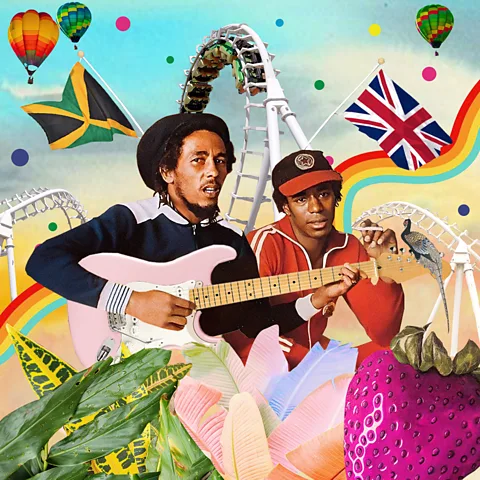 Idris Veitch
Idris VeitchIn the 20th Century, Patwa took on another layer of meaning as a language of spirituality and creativity through its link to the spiritual outlook of Rastafarians, a movement centred on themes of Pan-Africanism and liberation.
Bob Marley and the Wailers, and other Caribbean musicians, celebrated Rastafari values in their music and used a new way of speaking the Jamaican language, called “Rasta talk”, by some people. One element is so-called “overstandings” – where words are inverted to reveal a hidden truth. So, for instance, the term “understanding” is inverted to “overstanding”. Singh gives the example of the word “library”, which is inverted to the word “truebury” – a place where truth is found, in contrast to bad or oppressive libraries (“lie-bury”) with books that conceal or distort facts.
“The lesson everybody in the world can learn from speaking Jamaican is that language isn’t fixed – play around with languages,” says Singh.
Music also helped the language gain global status. Junior Marvin, my maternal grandad, was born in Jamaica, but spent his childhood in London and then later moved between the US and Jamaica while pursuing his musical career. As a child, I always admired his transatlantic version of Patwa, which gave him a global Jamaican identity. He would effortlessly switch between his London accent, US accent and the Jamaican language, yet uphold a strong sense of authenticity and respect in the family and amongst his peers. He made the Jamaican language feel like a hidden passport that held together his identity even as he toured the world.
“Better mus come,” he recently told me, a Jamaican phrase full of optimism meaning greater things are yet to come, as I begin to embark on a new chapter in my life.
A global language
There is another twist in the story of Patwa, which influenced how it’s spoken and perceived today – and directly connects it to my generation, and our impact on it: Jamaican emigration.
In the 1950s and 1960s, many families like mine emigrated from Jamaica to the US, Canada and the UK. They brought their languages with them.
In the 1990s, my younger brother and I would often spend time with our great-grandparents after school. Their home was a welcoming space with men and women of various generations from the Caribbean community, often stopping by for a cup of tea and a chat. When there was excitement and something to celebrate, or even some hot gossip, expressions like “woiii” and “ah dat mi a sey” would vibrate through the space.
Despite the older generations telling us to speak “proper English”, we would use these “secret” Patwa words in the playground at our London school, mingling with other Caribbean kids and non-Caribbean kids. We’d use a word like “gwaan” in moments of jubilation. Others were also using Patwa words at school, and we would share words we heard at home, at the barbershop or in reggae music. We would blend them with a hybrid of English words and the London slang that was popular at the time.
Without even realising, we were creating a hyper-speed development of Jamaican Patwa in London with our childhood wordplay. The resulting dialect, which has been documented from the 1980s onwards is known as Multicultural London English (MLE) or Black British English (BBE) and incorporates influences from the Jamaican language, cockney slang, South Asian languages, Arabic and West African Pidgin English.
Historically, such mixed languages were often portrayed as inferior, says Farquharson. “Languages back then [in the colonial era] were always viewed through a European lens,” he says, which was why the European languages were seen as standard or original, and other ones, as mixed or broken. But he points out that many if not all languages, including European languages, at some point evolved out of contact between different communities. Farquharson gives the example that Latin-rooted European languages like French, Portuguese, Spanish and Romanian could also be considered creoles.
“We could argue that some European languages are in fact simplified versions of Latin,” he says.
He suggests that since Jamaican Patwa is in essence a language like any other, it would make sense to drop the “Patwa”, and just refer to it as the Jamaican language. “If we are agreed that it is a language like any other language, then we don’t need to single it out in any special way,” he says, adding: “We’re using a very common system that’s used for other people and their languages, such as Spanish people who speak Spanish, and Polish people who speak Polish.”
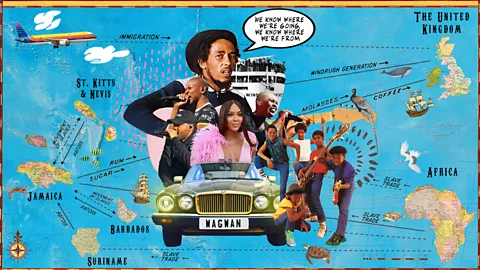 Idris Veitch
Idris VeitchWhen I turned 30, I arranged a trip to Jamaica with some friends – a homecoming, if you will. I remember yearning for a sense of connection to my Jamaican heritage, as well as being in search of answers about the meaning of life, my career and relationships – typical things a 30-year-old could be trying to navigate. Throughout my teenage years, Jamaica became a place of dissonance and rejection, particularly because of my sexuality and often feeling like a pariah because of my alternative interests, amongst the more traditional ideologies of some Jamaicans. Religion and radical Christian evangelism, first brought over by Europeans, has been at the root of the more traditional values on the island. Jamaica is even rumoured to have the most churches per square mile in the world.
I was in awe of the lushness, the natural rhythm and community on the island – there was something in the air that just felt right. It was surprising how easy it was for me to clearly communicate in the Jamaican language – even the conversations with people who had stronger dialects. It made me feel an unexpected inner joy and sense of completion. One of Bob Marley’s famous lyrics, “We know where we’re going, we know where we’re from”, had a significant meaning to me and my friends of Caribbean descent in that moment. It was the reclaiming of my identity as a British-Jamaican.
Others of my generation are also reclaiming the language, and shaping it in their own way. Roots & Ting is a social media platform that aims to make Black British history and culture more visible and accessible to global audiences. The founder of Roots & Ting, who also goes by the name Roots & Ting, was raised in a Caribbean household in the UK and shares similar memories to me. Jamaican Patwa was part of the fabric of their everyday life and often spoken by their family – but trying to join in came at the risk of being ridiculed. “They were keen to share the language and often spoke Patwa to me, but they would laugh at my attempts to sound like them,” says Roots & Ting.
However, Roots & Ting’s educational experience differed to mine. They initially attended a traditional British state primary school, then went to a Caribbean faith school in the UK, where Patwa permeated every aspect of school life.
“We would sing in choir using Patwa words, and some of the books we’d read were in Patwa too. Some of the teachers were born in the Caribbean and would use their languages in class,” says Roots & Ting. “I’d even write in my books in Patwa because that was the way I heard words at home. Teachers would often correct me and tell me to write in standard English. There was this unwritten understanding of when and where to use it,” they say. They describe their experience as positive, and says that it boosted their self-esteem and security in their identity.
“Being there taught me to be proud of my Caribbean heritage. It gave me the tools to reclaim the language in my adult life,” they say.
Learning to speak Jamaican
Today, as Jamaica is reconsidering its colonial-era ties with Britain, and planning to hold a referendum on whether to remove King Charles III as the head of state, some are calling for Patwa to gain formal recognition. On the other hand, the opposition party leader in Jamaica said last year that the country had a “language problem“, with many considering Patwa somehow unworthy and inferior to English.
As Tucker’s research shows, such concerns exist in the diaspora, too. “Many Afro-Caribbean and black immigrants moved to North America for greater social mobility and educational opportunities – they felt their language didn’t necessarily serve that purpose,” she says. She also highlights that parents felt there was a risk that if their child spoke Patwa, they might be given fewer educational opportunities, or be categorised as having delayed language development.
Recognising and valuing Jamaican as a language has real, practical consequences for children for whom Jamaican is their first language, Tucker says. “If we don’t acknowledge it as a language, then we put a lot of children at a terrible disadvantage,” she says, since those children would then just be seen as speaking a deficient form of English.
“Over 70% of Jamaicans supported bilingual education. These are very favourable results,” says Farquharson. He is also working on a dictionary of the language, called The Dictionary of the Jamaican Language, to recognise it as a language in its own right and its variety of dialects.
If Jamaica goes ahead with its plan to recognise Jamaican Patwa as an official language, Tucker says, it becomes easier to argue for bilingual educational opportunities: “This is not just about liberation. This is also about helping students to progress.”
“I want for the Jamaican language the same thing that English, French, German or Spanish people have for their languages. They are marketing their language as a commodity. Many non-speakers want to embrace the language and are even willing to pay to learn it,” says Farquharson.
Today, as generations of musicians including Sean Paul, Spice, Stefflon Don, Vybz Kartel and many others are reintroducing the world to newer Jamaican ways of speaking and singing, there is another layer to the debate: cultural appropriation. Some speakers of the language feel uncomfortable when others pick out certain words and use them whenever it benefits them, without having to grapple and live with the whole complex heritage of the language, and the potential exclusion and stigma for speaking it, as native speakers do.
“Some of the Jamaican language speakers I spoke to said, ‘You can learn the vocabulary and the grammar, but you can’t learn the flavour’,” says Tucker.
For me, growing up hearing but not actively speaking it much, has left some traces – I still pronounce some words incorrectly, for example. But my trip to Jamaica also revealed that I carry more of the language within me than I had thought, and am proud to be bilingual in Jamaican and English.
In London, the impact of Jamaican and other Caribbean languages is likely to continue and even grow, says Singh, while also mingling with African languages and wordplay in UK rap music: “All of that will just become a beautiful, melting pot for future generations to play around with,” he says.
For more science, technology, environment and health stories from the BBC, follow us on Facebook and X.

